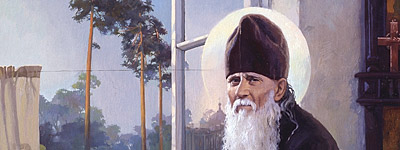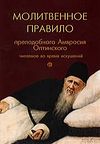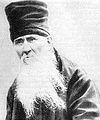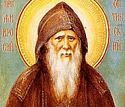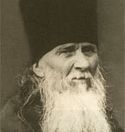 Martyrs Eulampius and Eulampia and 200 martyrs with them, at Nicomedia (303-311).
Martyrs Eulampius and Eulampia and 200 martyrs with them, at Nicomedia (303-311).  St. Ambrose, elder, of Optina Monastery (1891). St. Innocent, bishop of Penza (1819).
St. Ambrose, elder, of Optina Monastery (1891). St. Innocent, bishop of Penza (1819).
Martyr Theotecnus of Antioch (3rd-4th c.). St. Bassian of Constantinople (ca. 458). St. Theophilus the Confessor, of Bulgaria (716). Blessed Andrew of Totma (Vologda), fool-for-Christ (1673). Sts. Stephen (1094) bishops of Vladimir in Volhynia; and Amphilochius (1122), St. Yaropolk-Peter, prince of Vladimir in Volhynia (1086); St. Theodore (in monasticism Theodosius) of the Kiev Caves, prince of Ostrog in Volhynia (1483); St. Juliana, princess of Olshansk (ca. 1540); St. Job, abbot and wonderworker of Pochaev (1651); and Hieromartyr Macarius of Kanev, archimandrite, of Obruch and Pinsk (1678). Synaxis of the Saints of Volhynia:
New Hieromartyr Theodore (Pozdeyevsky), archbishop of Volokolamsk (1937).
Zographou Icon of the Most Holy Theotokos “Of the Akathist.”
St. Pinytus, bishop of Knossos on Crete (2nd c.). Martyrs of the Theban Legion, along the Rhine: Sts. Cassius and Florentius, at Bonn; Sts. Gereon and companions, at Cologne; and Sts. Victor and companions, at Xanten (Germany) (ca. 287). St. Paulinus, archbishop of York (644). St. Agilbert, bishop of Paris (ca. 680). Martyrdom by the Latins of the 26 Martyrs of Zographou Monastery on Mt. Athos: Abbot Thomas, Monks Barsanuphius, Cyril, Micah, Simon, Hilarion, Job, James, Cyprian, Sabbas, James, Martinian, Cosmas, Sergius, Paul, Menas, Ioasaph, Ioannicius, Anthony, Euthymius, Dometian, and Parthenius, and four laymen (1284).
Repose of Schemamonk Theodore, desert-dweller of Valaam (1834).
Wednesday. [Col. 1:18-23; Luke 8:22-25]
When they got in the ship to sail to
the other side of the lake, did the apostles think that
they would meet with a tempest and expose their lives to
danger? Meanwhile, a tempest suddenly arose and they did
not expect to remain alive. Such is the path of our life!
You do not know how or from where misfortune will sweep
in, capable of destroying us. Air, water, fire, beasts,
man, bird, house, in a word—everything around us
could suddenly be transformed into a weapon for our death.
From this comes a law: live in such a way that every
minute you are ready to meet with death and fearlessly
enter into its realm. This minute you are alive, but who
knows whether you will be alive the next? Keep yourself
according to this thought. Do everything you have to,
according to the routines of your life, but in no way
forget that you could immediately move to a country from
which there is no return. Forgetting this will not
postpone the determined hour, and intentional expulsion of
this decisive upheaval from your thoughts will not lessen
the eternal meaning of what will happen after it. Commit
your life and all into the hands of God; spend hour after
hour with the thought that each hour is the last. From
this the number of empty pleasures will decrease; while at
death this deprivation will be immeasurably recompensed
with a joy to which there is nothing equal in the joys of
life.


![]() Martyrs Eulampius and Eulampia and 200 martyrs with them, at Nicomedia (303-311).
Martyrs Eulampius and Eulampia and 200 martyrs with them, at Nicomedia (303-311). ![]() St. Ambrose, elder, of Optina Monastery (1891). St. Innocent, bishop of Penza (1819).
St. Ambrose, elder, of Optina Monastery (1891). St. Innocent, bishop of Penza (1819). 

